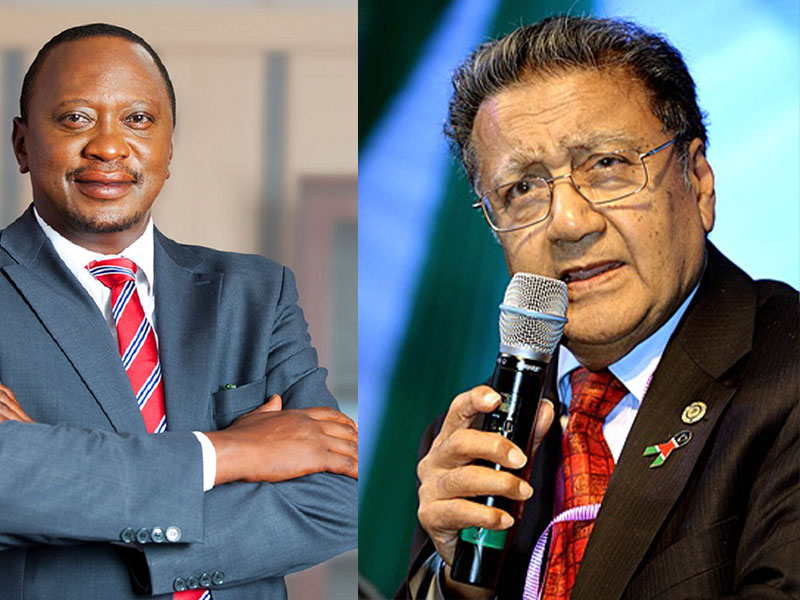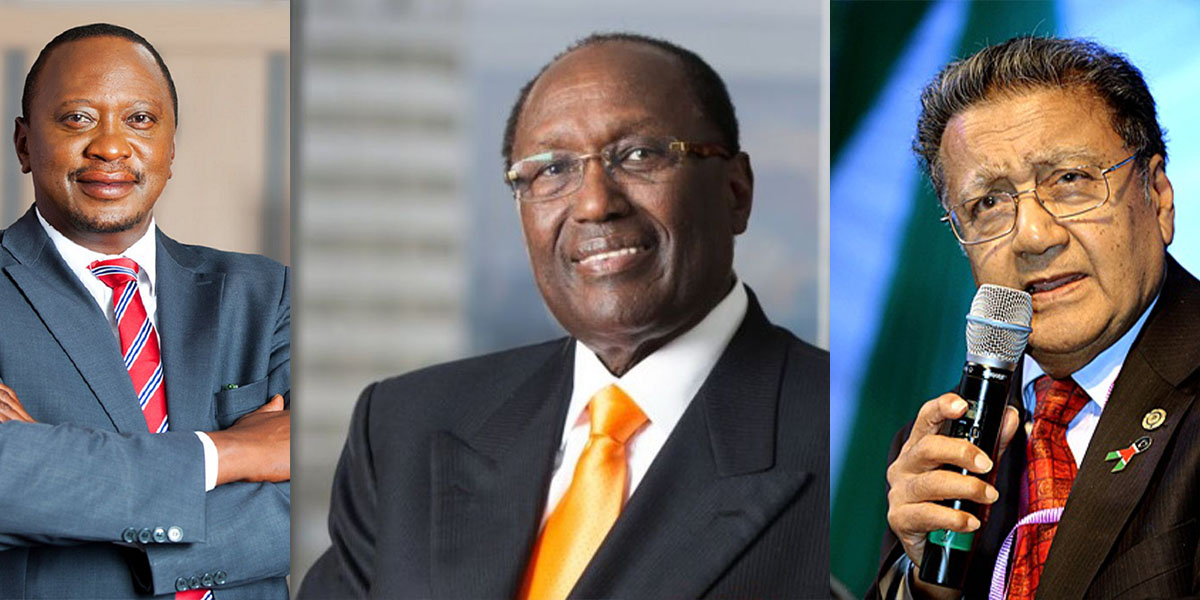Kenya, a nation rich in culture, history, and natural resources, is home to some of the wealthiest individuals in Africa. These individuals have not only amassed significant fortunes but have also played a pivotal role in shaping the country's economic landscape. From entrepreneurship to philanthropy, their stories inspire millions across the continent and beyond.
The wealthiest people in Kenya represent a diverse range of industries, including real estate, banking, telecommunications, and retail. Their success stories serve as a testament to the opportunities available in Kenya's growing economy. In this article, we will delve into the lives of these influential figures, exploring their achievements, business empires, and contributions to society.
As we explore the world of Kenya's richest individuals, we will also examine the factors contributing to their wealth and the challenges they have overcome. Understanding their journeys can provide valuable insights for aspiring entrepreneurs and investors looking to capitalize on Kenya's economic potential.
Read also:Savannah Humane Society A Beacon Of Compassion For Animals
Table of Contents
- Biography of Key Figures
- Economic Impact of Wealthy Individuals
- Key Industries Driving Wealth Creation
- Top 10 Richest Kenyans
- How Wealth is Created in Kenya
- Philanthropy and Community Contributions
- Challenges Faced by Wealthy Individuals
- Global Comparison of Wealth in Kenya
- Future Outlook for Kenya's Wealthy Elite
- Conclusion
Biography of Key Figures
Among the wealthiest people in Kenya, several individuals stand out due to their contributions to various sectors. Below is a brief overview of their backgrounds and achievements:
Biographical Data
| Name | Age | Net Worth | Industry |
|---|---|---|---|
| Naushad Merali | 85 | $2.4 billion | Manufacturing, Retail |
| Manu Chandaria | 94 | $1.5 billion | Real Estate, Manufacturing |
| Christine Mhando | 76 | $1.2 billion | Banking, Investments |
These individuals have built their empires through hard work, innovation, and strategic partnerships. Their stories highlight the importance of perseverance and adaptability in achieving financial success.
Economic Impact of Wealthy Individuals
The wealthiest people in Kenya have a significant impact on the country's economy. Their businesses create jobs, stimulate growth, and contribute to the overall GDP. According to the Kenya National Bureau of Statistics, the private sector accounts for over 80% of the country's employment opportunities.
Additionally, these individuals often reinvest their profits into new ventures, further boosting economic development. For example, Naushad Merali's Merali Group has expanded into various sectors, including healthcare and education, providing essential services to the Kenyan population.
Key Industries Driving Wealth Creation
Several industries have played a crucial role in the creation of wealth among Kenya's richest individuals. These include:
- Real Estate: With rapid urbanization, the demand for housing and commercial spaces continues to grow.
- Telecommunications: Companies like Safaricom have revolutionized communication and financial services in Kenya.
- Retail: The rise of shopping malls and e-commerce platforms has transformed the retail landscape.
- Manufacturing: Local production of goods reduces reliance on imports and creates jobs.
Investing in these sectors has enabled Kenya's wealthiest individuals to amass significant fortunes while contributing to the country's economic growth.
Read also:New Vision Coop A Gateway To Sustainable And Collaborative Growth
Top 10 Richest Kenyans
Ranking and Profiles
Here is a list of the top 10 wealthiest individuals in Kenya, based on their net worth and influence:
- Naushad Merali - $2.4 billion
- Manu Chandaria - $1.5 billion
- Christine Mhando - $1.2 billion
- James R. Mworia - $800 million
- Said Salim Bin Hassan - $750 million
- Philip Ndegwa - $650 million
- Paul G Ikolomani - $550 million
- Joseph Kangethe - $500 million
- Samuel Kirubi - $450 million
- Chris Kirubi - $400 million
Each of these individuals has made a lasting impact on Kenya's economy and society, showcasing the potential for success in the country.
How Wealth is Created in Kenya
Wealth creation in Kenya is driven by a combination of factors, including:
- Entrepreneurial spirit: Many of Kenya's richest individuals started as small business owners and grew their ventures into large corporations.
- Access to capital: Financial institutions and investors play a critical role in funding business growth and expansion.
- Government policies: Favorable regulations and incentives encourage investment and innovation.
- Global partnerships: Collaborations with international companies and organizations help Kenyan businesses access new markets and technologies.
Understanding these factors can help aspiring entrepreneurs identify opportunities for wealth creation in Kenya.
Philanthropy and Community Contributions
Many of Kenya's wealthiest individuals are also committed to giving back to their communities. Through charitable foundations and initiatives, they support education, healthcare, and social welfare programs. For instance:
- Naushad Merali's Merali Foundation funds scholarships and community development projects.
- Manu Chandaria's Chandaria Foundation focuses on education and entrepreneurship.
- Christine Mhando's Equity Group Foundation promotes financial inclusion and empowerment.
These efforts demonstrate the importance of using wealth to drive positive change and improve the lives of others.
Challenges Faced by Wealthy Individuals
Despite their success, Kenya's wealthiest individuals face several challenges, including:
- Economic instability: Fluctuations in the global economy can impact their businesses and investments.
- Regulatory hurdles: Navigating complex laws and regulations can be time-consuming and costly.
- Social inequality: Addressing the wealth gap and ensuring equitable distribution of resources remains a significant challenge.
Overcoming these obstacles requires a combination of strategic planning, innovation, and collaboration with government and community stakeholders.
Global Comparison of Wealth in Kenya
When compared to other countries, Kenya's wealthiest individuals rank among the top in Africa. However, they still lag behind their counterparts in developed nations. According to the Wealth Report 2023 by Knight Frank, Kenya has approximately 2,000 high-net-worth individuals (HNWIs), compared to over 100,000 in the United States.
This disparity highlights the need for continued investment in education, infrastructure, and innovation to bridge the gap and promote sustainable economic growth.
Future Outlook for Kenya's Wealthy Elite
The future looks promising for Kenya's wealthy elite, as the country continues to experience rapid economic growth and development. Key trends to watch include:
- Technological advancements: The adoption of digital technologies will transform industries and create new opportunities for wealth creation.
- Sustainability: Increasing focus on environmental and social responsibility will shape business practices and investments.
- Youth empowerment: Investing in the next generation of entrepreneurs and leaders will ensure long-term success and prosperity.
By embracing these trends, Kenya's wealthiest individuals can continue to lead the charge in driving economic progress and innovation.
Conclusion
The wealthiest people in Kenya have achieved remarkable success through their hard work, determination, and strategic vision. Their contributions to the economy and society have made a lasting impact, inspiring countless others to pursue their dreams and aspirations. As Kenya continues to grow and develop, the role of these influential figures will remain vital in shaping the nation's future.
We invite you to share your thoughts and insights in the comments section below. Additionally, explore other articles on our site to learn more about Kenya's economic landscape and the opportunities it offers. Together, we can build a brighter future for all.
Data sources: Kenya National Bureau of Statistics, Knight Frank Wealth Report 2023, Bloomberg, Forbes.


